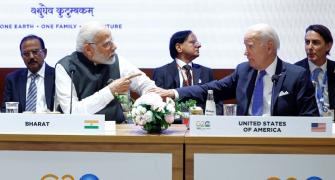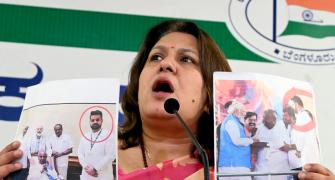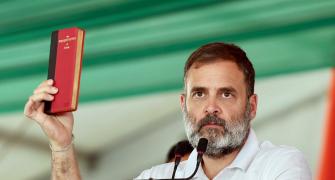Small is beautiful when it comes to India's car market. Though India's auto industry is nowhere near as developed as China's, investment is starting to pour into the small-car segment.
Global auto companies such as Hyundai and Honda and local ones such as Tata Motors and Maruti Udyog, a subsidiary of Japan's Suzuki Motor, are rushing forward with plans to launch small car models they hope will click with India's emerging middle class.
While India is the fabled "back office of the world," Prime Minister Manmohan Singh's government has big aspirations to build up the country's manufacturing sector, and small-car manufacturing is a huge priority.
The sector received a big boost in late February when Finance Minister Palaniappan Chidambaram announced plans to reduce excise duties on small cars from 24% to 16% to spur investment.
Small cars already account for 70% of India's total one-million-car yearly market -- a figure that is expected to double in the next four years. Around a dozen new small and compact cars, with engine capacities ranging from 1,000 cc to 1,500 cc, are expected to hit the market in the next two years in gasoline, diesel, and hybrid-engine models. India's long-range potential could be impressive.
A study by consulting firms Booz-Allen Hamilton and McKinsey predicts that India's domestic car market will cross 3.5 million by 2015.
Price wars?
The big challenge as always in India is delivering cars at the lowest price possible to make them affordable to the mass market. Tata Motors Chairman Ratan Tata two years ago announced plans to launch a small car by 2008 with a $2,200 price tag. A decade ago, Tata launched the Indica, India's first indigenously-built car.
Tata is exploring other small-car launches with its joint-venture partner Fiat to complement the compact Grande Punto.
Maruti Udyog, in which Suzuki has more than a 50% stake, is said to be working at lowering the cost of its base model Maruti 800 -- currently selling at $4,130 -- to compete with Tata. The company boasts a portfolio of about 11 brands including the Omni, the Esteem, and the premium small car Zen; plus Suzuki brands such as the Alto, WagonR, and Versa, the off-road vehicle Gypsy, and the luxury sport-utility vehicle Grand Vitara.
Big Japanese automakers such as Toyota and Honda are also looking at major expansion plans in India. Honda, which established a motorcycle joint venture in India back in 1984, is aiming to double auto-production capacity at its local unit, Honda Siel Cars, to 100,000 by the end of 2007.
Attractive market
It rolled out an Indian version of the Civic in July, and hopes to sell more than 150,000 units a year by 2010. "India is one of the most important business areas for Honda, with the highest growth potential," said Honda President and Chief Executive Officer Takeo Fukui at a press conference back in July.
Toyota and its subsidiary Daihatsu will together invest $86 million to make 100,000 vehicles a year at a facility in Bangalore. The capacity will be doubled by 2010. The company has said it wants to grab a 10% share by the end of the decade. However, it has a long way to go to catch up with Suzuki Maruti, which controls over 50% of the Indian passenger-car market
Automakers of all stripes are attracted to India, thanks to its galloping economy, increasing disposable income, and young population. In addition, the small-vehicle segment is a great avenue into India's sizable rural market.
Largest segment
Two-thirds of India's over one billion people live in the hinterlands, where they earn less money than their urban counterparts. The excise duty cuts may well, for the first time, make small cars affordable for these potential buyers. Recently New Delhi said that automobile sales would jump from $34 billion this year to $145 billion in 2016.
If those projections hold up, auto sales would account for 10% of India's gross domestic product (GDP).
P. Balendran, vice-president of General Motors India, points out that "in terms of volumes, the mini segment remains the largest opportunity area for manufacturers." General Motors has four vehicles -- Chevrolet's Optra, the multi-utility vehicle Tavera, the Aveo, and the Chevy SRV, a premium "sportsback" -- available in India.
And the company will launch the hatchback Chevrolet Spark, a refined version of Daewoo Motors' small car, the Matiz, by next April. General Motors is investing $300 million in a new plant with annual capacity of 140,000 vehicles.
Volkswagen, which has a huge manufacturing footprint in China, is also getting serious about India. It has announced plans to invest $540 million to build a plant to make 100,000 small cars a year for the Indian market.
While not official, there's talk of the western India state of Maharashtra as the location for the new plant. Its current assembly operation in that state already produces 25,000 Skoda Octavias annually.
Doubling capacity
Other notable investments include a plan by Hyundai Motor, which sells the Santro and the Getz in the Indian small- and compact-car segment, to invest $700 million in a new plant, including an engineering and transmission facility in Madras.
There is also speculation that Ford and its Japanese partner Mazda may launch a small car for the India market later in the decade. "The Indian auto market is growing rapidly, and we continue to explore all opportunities for growth," says Ford (India) Managing Director Arvind Mathew, based in Madras.
India car-market leader Suzuki hopes to extend its lead by investing $650 million to expand, make diesel cars, and set up a new plant in Manesar in the northern state of Haryana. The new facility will make a compact car with global partner Nissan. It plans to double capacity to 1 million vehicles a year by 2010.
Some of that new capacity will be exported to other markets such as Europe, and Suzuki will see its production costs go lower over time. "If you have a large production base, any incremental production comes cheaper," says ABN Amro auto analyst Pramod Amte.
What could mar this upbeat picture? One big threat would be an unexpected slowdown in India's economy that would stretch the pocketbook limits of Indian consumers, who tend to borrow to finance their car purchases. Also, if India's road infrastructure doesn't improve fast, that could brake growth.
But right now, India's economy is on a strong growth track. Until that outlook changes, automakers in India will continue to bet big on the small-car segment.







